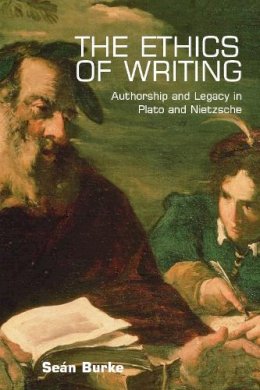8%OFF

Stock image for illustration purposes only - book cover, edition or condition may vary.
The Ethics of Writing: Authorship and Legacy in Plato and Nietzsche
Dr. Sean Burke
€ 41.99
€ 38.46
FREE Delivery in Ireland
Description for The Ethics of Writing: Authorship and Legacy in Plato and Nietzsche
Paperback. The ethical question is the question of our times. Within critical theory, it has focused on the act of reading. This original and courageous study reverses the terms of inquiry to analyse the ethical composition of the act of writing. Num Pages: 256 pages. BIC Classification: DSA. Category: (UP) Postgraduate, Research & Scholarly. Dimension: 234 x 158 x 15. Weight in Grams: 392.
Beginning amidst the tombs of the 'dead' God, and the crematoria at Auschwitz, this book, newly available in paperback, confronts the Nietzschean legacy through a Platonic focus. Plato argues in the Phaedrus that writing is dangerous because it can neither select its audience nor call upon its author to the rescue. Yet, he transgresses this ethical imperative in the Republic which has proved defenceless against use and abuse in the ideological foundation of totalitarian regimes. Burke goes on to analyse the dangerous games which Plato and Nietzsche played with posterity. At issue is how authors may protect against 'deviant readings' and assess 'the risk of writing'. Burke recommends an ethic of 'discursive containment'. The ethical question is the question of our times. Within critical theory, it has focused on the act of reading. This study reverses the terms of inquiry to analyse the ethical composition of the act of writing. What responsibility does an author bear for his legacy? Do 'catastrophic' misreadings of authors (e.g. Plato, Nietzsche) testify to authorial recklessness? These and other questions are the starting-point for a theory of authorial ethics which will be further developed in a forthcoming book on the interanimating thought of Emmanuel Levinas and Jacques Derrida. Continuing the mission of the 'returned author' begun in his pioneering book The Death and Return of the Author, Burke recommends the 'law of genre' as a contract drawn up between author and reader to establish ethical responsibility. Criticism, under this contract, becomes an ethical realm and realm of the ethical. Key Features *An original, provocative and arresting construction of a new debate: the responsibility of authors for the effects of their works *Courageous discussion of catastrophic readings which played a part in the establishment of totalitarian regimes such as Nazism, Fascism, and Communism *An extension of the author's pioneering work on authorship into its ethical and political significance
Product Details
Publisher
Edinburgh University Press United Kingdom
Number of pages
256
Format
Paperback
Publication date
2010
Condition
New
Number of Pages
256
Place of Publication
Edinburgh, United Kingdom
ISBN
9780748641796
SKU
V9780748641796
Shipping Time
Usually ships in 5 to 9 working days
Ref
99-10
About Dr. Sean Burke
Sean Burke worked in the Department of English Studies at the University of Durham for thirteen years, and has now retired. His academic publications include The Death and Return of the Author: Criticism and Subjectivity in Barthes, Foucault and Derrida (3rd edn, 2008), Authorship: From Plato to the Postmodern: A Reader (1995) and The Ethics of Writing: Authorship and Legacy in Plato and Nietzsche (2008). His first novel, Deadwater (2002) has been published in France as Au bout des docks (2007). He is currently researching a study of discursive ethics in Plato, Levinas and Derrida.
Reviews for The Ethics of Writing: Authorship and Legacy in Plato and Nietzsche
Burke argues compellingly that no author is completely beyond ethical recall on the ground of artistic immunity or aesthetic irrelevancy... Highly recommended. Choice Burke argues compellingly that no author is completely beyond ethical recall on the ground of artistic immunity or aesthetic irrelevancy... Highly recommended.
